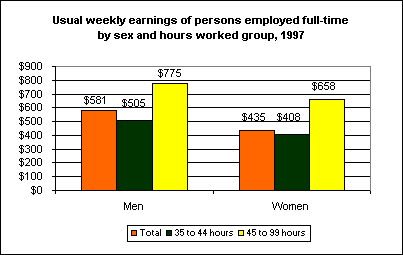An official website of the United States government
 United States Department of Labor
United States Department of Labor
In 1997, men working as physicians ($1,134), lawyers ($1,057), electrical/electronic engineers ($955), civil engineers ($950), computer scientists ($919), industrial engineers ($873), and operations researchers ($867) earned more per week working standard hours than the average for men working extended hours. Among women, physicians ($1,106), computer scientists ($834), lawyers ($807), engineers ($801), and college teachers ($727) earned more working standard hours than the average for women working extended hours.

[Chart data—TXT]
Not surprisingly, these occupations generally require a college degree for entry. Physicians and lawyers require a professional degree; most college teachers require a doctoral or professional degree. Engineers, computer scientists, and schoolteachers generally need a bachelor's degree, and registered nurses need at least an associate degree.
Among all workers, weekly earnings for men who worked 35 to 44 hours per week averaged $505, compared with $775 for men who worked 45 to 99 hours per week. Weekly earnings for women who worked 35 to 44 hours per week averaged $408, compared with $658 for women who worked 45 to 99 hours per week.
These data are a product of the Current Population Survey. More information may be obtained from "How hours of work affect occupational earnings,"Monthly Labor Review, October 1998.
Bureau of Labor Statistics, U.S. Department of Labor, The Economics Daily, High earnings without long hours a possibility at https://www.bls.gov/opub/ted/1999/jan/wk1/art04.htm (visited February 18, 2026).

